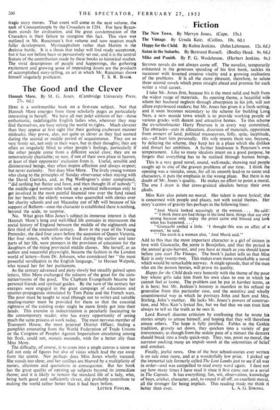Fiction
The New Town. By Mervyn Jones. (Cape. 15s.) The Vintage. By Ursula Keir. (Collins. 10s. 6d.) SECOND novels do not always come off. The novelist, temporarily exhausted in the generous spending of his first book, tackles its successor with lessened creative vitality and a growing realisation of the problems. It.4 all the more pleasant, therefore, to salute three second novels which press straight ahead and promise for each writer a vital career.
I take Mr. Jones first, because his is the most solid and built from the widest range of materials. Its opening theme, a beautiful wife whom her husband neglects through absorption in his job, will not allure experienced -readers; but Mr. Jones has given it a fresh setting, and it soon becomes secondary to the scheme for building Long Ness, a new seaside town which is to provide working people of various grades with decent and attractive homes. To this scheme the ex-schoolmaster Harry Peterson is in every way committed. The obstacles—cuts in allocation, diversion of materials, opposition from owners- of land, political manoeuvres, folly, spite, ineptitude, etc.—all hurt him personally. His wife resents them too, because, by delaying the scheme, they keep her in a place which she dislikes and thwart her ambition. A further hindrance is Peterson's own temperament. Like so many idealists intent on a good purpose, he forgets that everything has to be realised through human beings.
This is a very good novel, sound, well-made, showing real people caught up in one of the gravest problems of our time. I think the opening was a mistake, since, for all its smooth lead-in to scene and characters, it puts the emphasis in the wrong place. But there is no doubt of Mr. Jones's quality. He makes no effort to point a moral. The one I draw is that cross-grained idealists betray their own ideals.
Miss Keir also points no moral. Her talent is more lyrical; she is concerned with people and places, not with social themes. Her story's centre of gravity lies perhaps in the following lines: "Jose Maria looked accusingly at the woman.... He said: "`I think there are bad things in the land here, things that are Very strong because only today the priest came and blessed and look what has happened. . .
" Giancarlo smiled a little. ' I thought this was an affair of a woman,' he said.
" The earth is a woman also, ' Jose Maria said."
Add to this that the most important character is a girl of sixteen in love with Giancarlo, the scene is Beaujolais, and that the period is the annual grape-harvest, and you have as much as you should know before you start The Vintage. The book's jacket tells us that Miss Keir is only twenty-two. This makes even more remarkable a novel which would be remarkable anyway. A single episode, that of the man who ate the poison berries, will prove its quality.
Happy for the Child deals very honestly with the theme of the poor boy whose gifts take him from his own class to one in which he cannot feel at home. The problem can be put in harsher terms, as it is here; but Mr. Jenkins's honesty is manifest in his refusal to generalise from this particular case, and the sensitive and wholly unsentimental way in which he portrays John and Sam and Mrs. Stirling, John's mother. He lacks Mr. Jones's powers of construc- tion, and Miss Keir's lyrical fire, but we feel that we can trust him always to tell us the truth as he sees it. Lord Russell disarms criticism by confessing that he wrote his stories simply to amuse himself, and hoping that they will therefore amuse others. The hope is fully justified. Fables in the Gothic - tradition, gravely- set down, they quicken into a variety of gay irreverences; as though from the sedate pace of a minuet the dancers should break into a lively quick-step. They, too, point no moral, the narrator cocking many an impish snook at the solemnities of belief and conduct.
Finally, joyful news. One of the best school-stories ever written is on sale once more, and at a wonderfully low price. I picked up the immortal tale formerly called The Lost Lambs just to see if all was in order—and was compelled to read every word again. I dare not say how many times I have read it since it first came out as a serial in The Captain. It has everything; fun, wit, observation, knowledge of boys, cricket, character, and, to round it all off, an excellent moral, all the stronger for being implicit. This reading made me think it


































 Previous page
Previous page